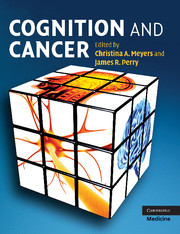Book contents
- Frontmatter
- Contents
- List of contributors
- Preface
- Section 1 Cognition and the brain: measurement, tools, and interpretation
- Section 2 Effects of cancer and cancer treatment on cognition
- Section 3 Interventions and implications for clinical trials
- 20 Behavioral strategies and rehabilitation
- 21 Support services
- 22 Pharmacological interventions for the treatment of radiation-induced brain injury
- 23 Neurocognitive testing in clinical trials
- Index
- Plate section
- References
21 - Support services
Published online by Cambridge University Press: 13 August 2009
- Frontmatter
- Contents
- List of contributors
- Preface
- Section 1 Cognition and the brain: measurement, tools, and interpretation
- Section 2 Effects of cancer and cancer treatment on cognition
- Section 3 Interventions and implications for clinical trials
- 20 Behavioral strategies and rehabilitation
- 21 Support services
- 22 Pharmacological interventions for the treatment of radiation-induced brain injury
- 23 Neurocognitive testing in clinical trials
- Index
- Plate section
- References
Summary
Introduction
Whether the primary treatment approach to cognitive impairment in cancer is remediation/rehabilitation, pharmacotherapy, or a combination, one must not underestimate the importance of comprehensive support services throughout the illness continuum.
Cognitive deficits related to cancer may be primary, related to the disease entity itself, or may be secondary, related to the various methods used to treat the cancer. Such deficits may also be related to direct and indirect co-morbidities of the cancer and treatments. Among the most common co-morbidities are mood disturbances (e.g., depression, anxiety) and fatigue. Fatigue is the most widely reported deleterious symptom in adult cancer patients (Valentine & Meyers, 2001). Additionally, in childhood cancer survivors, fatigue and “aches and pains” are reported as most problematic relative to other symptoms (Zebrack & Chesler, 2002). In this chapter, we will consider cognitive deficits, mood disturbances or emotional distress, and fatigue as highly inter-related symptoms of cancer and will discuss support services that may apply to one or more of these conditions in isolation or in combination.
Support has many definitions, but is generally understood as strengthening the patient's and family's resources by providing emotional, informational, and practical assistance as needed, and by appropriately fostering a sense of hope or optimism. Here, we refer to a wide range of strategies designed to improve emotional and social adjustment and functioning, increase coping, assist with decision-making, and minimize distress.
Information
- Type
- Chapter
- Information
- Cognition and Cancer , pp. 295 - 311Publisher: Cambridge University PressPrint publication year: 2008
